|
|
|
Sort Order |
|
|
|
Items / Page
|
|
|
|
|
|
|
| Srl | Item |
| 1 |
ID:
111936
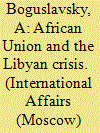

|
|
|
|
|
| Publication |
2012.
|
| Summary/Abstract |
ARLY IN SEPTEMBER 2011, the forces of the National Transitional Council (NTC) of Libya backed, on a mass scale, by NATO assumed control over the larger part of the country and captured Tripoli. The regime change became a fact yet the country will have to tread a long and arduous road of rehabilitation of its now practically non-existent infrastructure and address a more important and even more challenging task of national reconciliation and revival of national unity. It seems that external military interference (far beyond the limits outlined by UN Resolution 1973) has made this dual task even harder to achieve. It caused unnecessary loss of civilian lives, stirred up hard feelings which pushed the east and west of the country apart, destroyed civilian objects and started uncontrolled proliferation of all sorts of weaponry.
|
|
|
|
|
|
|
|
|
|
|
|
|
|
|
|
| 2 |
ID:
166212
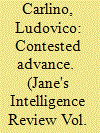

|
|
|
| 3 |
ID:
163250
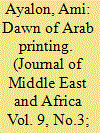

|
|
|
|
|
| Summary/Abstract |
The adoption of printing in the Ottoman Arab provinces in the nineteenth century portended a cultural transformation with profound implications, known as the nahda. Focusing on the Syrian town of Tripoli (Tarabulus al-Sham) as a case study, the article examines the historic cultural change from a peripheral vantage point. It looks at the impact of Arab printing and publishing, which evolved primarily in Cairo, Alexandria, and Beirut, on a community on the fringe of cultural change and examines its cultural interrelationship with these centers. Its findings show that, more than acting as mere consumers of print, Tripoli residents in substantial numbers took an active part in the discourse on social and cultural dilemmas which printing facilitated across the region, before adopting similar novelties in their own town toward the end of the century. The probe casts light on the manifold process by which printing, its products, and its diffusion mechanisms spread throughout the region. As printing was a key channel for circulating news and views, the study also affords a credible notion of the role that communities away from the production epicenters played in the nahda.
|
|
|
|
|
|
|
|
|
|
|
|
|
|
|
|
| 4 |
ID:
110098
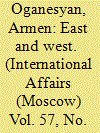

|
|
|
|
|
| Publication |
2011.
|
| Summary/Abstract |
A WEEK BEFORE TRIPOLI FELL to the insurgents, a glamour model and ex-girlfriend of Mutassim, one of Colonel Gaddafi's sons, had come to the Libyan capital. Talitha van Zon, the former Playboy centerfold, who claimed that she had parted with Mutassim Gaddafi several years ago, could not explain why she came to the country torn apart by a civil war.
In any case very soon the toasts to a victory over the rebels were drowned out by the sounds of shooting and shouts by the same rebels at doors of her hotel. "The Dutch model was then paraded in front of rebel fighters who chanted 'petrol.' She feared they would 'burn her alive' and then made a desperate escape by leaping from the hotel's balcony" breaking her hand. Rescued by a Dutch journalist who helped her, together with other refugees to leave the country on a humanitarian ship, she reached Malta. The media all over the world informed their readers and viewers that "glamour model ex-girlfriend of Gaddafi's son escapes rebels after they threatened to 'burn her alive'" the reports supplied with a lavish selection of her photos.
|
|
|
|
|
|
|
|
|
|
|
|
|
|
|
|
| 5 |
ID:
034855
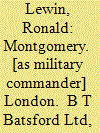

|
|
|
|
|
| Publication |
London, B T Batsford Ltd, 1971.
|
| Description |
xv, 288p.Hbk
|
| Standard Number |
713412089
|
|
|
|
|
|
|
|
|
|
|
|
Copies: C:1/I:0,R:0,Q:0
Circulation
| Accession# | Call# | Current Location | Status | Policy | Location |
| 009991 | 923.541/LEW 009991 | Main | On Shelf | General | |
|
|
|
|
| 6 |
ID:
001121


|
|
|
|
|
| Publication |
Pennsylvania, Combined Publishing, 1998.
|
| Description |
xiii, 288p.: maps.Pbk
|
| Standard Number |
0938289179
|
|
|
|
|
|
|
|
|
|
|
|
Copies: C:1/I:0,R:0,Q:0
Circulation
| Accession# | Call# | Current Location | Status | Policy | Location |
| 040571 | 923.5/LEW 040571 | Main | On Shelf | General | |
|
|
|
|
| 7 |
ID:
174147
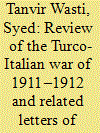

|
|
|
|
|
| Summary/Abstract |
From the time of the 1877 Turco-Russian war till its disappearance from the stage of history in 1922, the Ottoman Empire was involved in decades of almost continuous war – in Europe, on the Russian front and in the Middle East. The conflict with Italy of 1911–1912 was an example of how powers in decline are forced into war in the face of peremptory demands from stronger neighbours. Italy's unprovoked attack on the Ottoman provinces of Libya in North Africa paved the way for the Balkan Wars of 1912–1913 and indirectly also hastened the First World War. A group of Ottoman Turkish military officers along with their Arab and Berber Muslim allies in Libya made a heroic defensive stand and kept the Italian naval invasion pinned to the coastal beach-heads of Libya.
|
|
|
|
|
|
|
|
|
|
|
|
|
|
|
|
| 8 |
ID:
098390
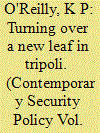

|
|
|
|
|
| Publication |
2010.
|
| Summary/Abstract |
Over the past decade, Libya's international reputation has undergone a remarkable transformation. Previously a rogue state, Libya has been welcomed back into the international community after renouncing international terrorism and its weapons of mass destruction programs. Was this the result of a straightforward calculation of self-interests given the realities of the international system or some shift in Libyan leader Mu'ammar Qaddafi's world view? To assess this transformation, operational code analysis is utilized to systematically identify Qaddafi's world view and determine whether he underwent experiential learning, attributable to fundamental transformation of his world view, or a simple adaptation to the surrounding international environment. The findings indicate that while experiencing a modest degree of learning over time, Qaddafi did not undergo a significant transformation, but rather adapted to the international system around him. The analysis here supports viewing Libya's transformation cautiously, as perhaps a limited, temporary, and pragmatic move. For foreign actors trying to deal with seemingly other unpredictable leaders, the Libyan experience suggests that decision-making should be based on greater knowledge about the motives of individual leaders and their responsiveness to specific initiatives.
|
|
|
|
|
|
|
|
|
|
|
|
|
|
|
|
|
|
|
|
|